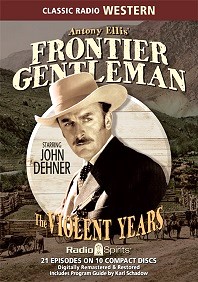
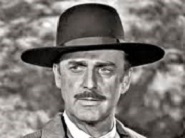 Frontier Gentleman (February 2, 1958–November 16, 1958) aired “Belle Siddons’ Encore” on August 24, 1958 as the 29th of the short-lived series’ 41 episodes. The length of this quality western had more to do with the fact that by 1958 television had become the dominant entertainment venue in America, and this new medium was already into reruns of any number of TV westerns. Frontier Gentleman, while not groundbreaking as was Gunsmoke (on radio and TV, for instance), and while exhibiting a novel approach of its own when it came to character over action in most cases, still could not break through the glass ceiling—or glass television screen—and last longer than it did.
Frontier Gentleman (February 2, 1958–November 16, 1958) aired “Belle Siddons’ Encore” on August 24, 1958 as the 29th of the short-lived series’ 41 episodes. The length of this quality western had more to do with the fact that by 1958 television had become the dominant entertainment venue in America, and this new medium was already into reruns of any number of TV westerns. Frontier Gentleman, while not groundbreaking as was Gunsmoke (on radio and TV, for instance), and while exhibiting a novel approach of its own when it came to character over action in most cases, still could not break through the glass ceiling—or glass television screen—and last longer than it did.
Speaking of the novel approach the series took in portraying the western, its protagonist was of a different stripe altogether. This so-called frontier gentleman was an Englishman. His name was J. B. Kendall and he had spent most of his career as a British Cavalry officer in the Punjab region of Northwest India/Eastern Pakistan. He accepts a position as a correspondent for The London Times to travel to the Wyoming and Montana territories of the still-forming United States in the post-Civil War 1870s. His mandate is to report first-hand what he sees and learns of this still untamed land, with its warring Indian tribes, sometimes successful, often-times failing bouts of exploration, colonization, and pretty much still lawless time in the young country.
The inestimable TV, film, and radio actor John Dehner (1915-1992, photo top right) would win the role of J. B. Kendall and he played it to perfection, even answering the question as to why his British accent seemed almost unnoticeable. Dehner’s distinctive voice was one of his recognizable calling cards across his numerous radio appearances, placing him in the top rank of favorite radio voices along with those of Orson Welles, William Conrad, and Frank Lovejoy. Non-plussed when this top-notch western series was cancelled, Dehner was hard at work on another western series within a week, none other than Have Gun—Will Travel, as the well-educated but tough gun-for-hire, Paladin. For more on Dehner’s background, of which I found numerous items of interest, click on the Have Gun—Will Travel link above. John Dehner died in 1992 of complications from emphysema and diabetes.
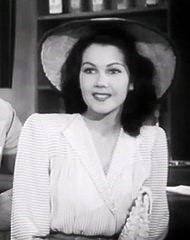 Jeanne Bates (1918-2007) would play Madame Belle Siddons in a four-story arc beginning with episode 21, and would finish the arc in episodes 29, 30, and 31 (of which this is episode 29). Bates had a remarkable career in radio, TV, and film. Among some of her notable roles were (in no order): Murder Will Out & Gunsmoke (radio), Peter Gunn, Sky King, The Lone Ranger, 3 appearances on Perry Mason in 1960, Ben Casey, and Rawhide (all on TV), and a few notable films she appeared in were The Strangler (1964), Suppose They Gave a War and Nobody Came (1970), Eraserhead (1977), and of the four films near the end of her career she had small parts in, two were Die Hard 2 (1990), and Mulholland Drive (2001). Jeanne Bates died of breast cancer in 2007.
Jeanne Bates (1918-2007) would play Madame Belle Siddons in a four-story arc beginning with episode 21, and would finish the arc in episodes 29, 30, and 31 (of which this is episode 29). Bates had a remarkable career in radio, TV, and film. Among some of her notable roles were (in no order): Murder Will Out & Gunsmoke (radio), Peter Gunn, Sky King, The Lone Ranger, 3 appearances on Perry Mason in 1960, Ben Casey, and Rawhide (all on TV), and a few notable films she appeared in were The Strangler (1964), Suppose They Gave a War and Nobody Came (1970), Eraserhead (1977), and of the four films near the end of her career she had small parts in, two were Die Hard 2 (1990), and Mulholland Drive (2001). Jeanne Bates died of breast cancer in 2007.
Noted radio scripter Antony Ellis (1920-1967) was born English but became a naturalized American citizen. He capped his unbridled fascination for the American Old West by writing each episode of Frontier Gentleman. They were noted for their historical accuracy and depth of character development within the half-hour time restriction. He and series star John Dehner were good friends in real life. Antony was married to Georgia Ellis (1917-1988), who starred as Kitty in radio’s Gunsmoke.
Future award-winning film composer Jerry Goldsmith (1929-2004) would be responsible for the show’s musical theme. Of his many film scores, a few of the more recognizable would include Alien (1970), L. A. Confidential (1997), Patton (1970), The Sand Pebbles (1966), The Wind and the Lion (1975), Chinatown (1974), Planet of the Apes (1968), Logan’s Run (1976), Star Trek: The Motion Picture (1979), and The Lost World: Jurassic Park (1997). From his wiki page, “Over the course of his career, Goldsmith received 18 total Academy Award nominations, making him one of the most nominated composers in the history of the Awards. Despite this, Goldsmith won only one Oscar, his score for The Omen (1976). This makes Goldsmith the most nominated composer to have won an Oscar only on one occasion.” Jerry Goldsmith died of colon cancer in 2004.
This episode is the 2nd of the 4-story arc featuring Belle Siddons. (If you would care to get in on this mini-series featuring Belle Siddons from the start, you can catch the first episode we showcased from September 2022 here.) This current episode involves an old flame of Belle’s who may or may not be involved in an upcoming gold shipment robbery and the sheriff who knows Belle might know more than she is letting on. Belle flirts with Kendall while at the same time trying to stay on the right side of the law, but the episode ends before we learn if the gold shipment will be robbed and by whom (Belle’s old flame?). Belle Siddon is an intriguing woman, former Confederate spy and now legitimate owner of a traveling gambling enterprise, set up to do business now in Deadwood, Dakota Territory, where she finds herself befriending the equally intriguing Englishman, a transplanted correspondent for The London Times, one J. B. Kendall, a true Frontier Gentleman.
On a final note, this 4-episode story arc is an odd duck, for the overwhelming majority of vintage radio episodes are of the 30-minute self-contained variety, and not strung out over multiple episodes with issues or plot points unresolved, as is this one. Following this episode only two stories in this mini-story arc remain. If you would care to listen to these concluding episodes, I will be showcasing the final pair in the next two weeks. I’m beginning to appreciate each one more and more every time I hear one, and I think you’ll enjoy listening to them as well.
(The linked CD at the top includes all 4 Belle Siddons episodes..)
Play Time: 24:46
{This episode of Frontier Gentleman aired on a Sunday evening in late August of 1958, leaving the neighborhood gang a long week before their summer vacation would end and another school year would begin. Thus, the next day found them early at the corner newsstand, one of the last school days for such an early morning trip before the new school year would make such a trip out of the question. By 1958 most of the traditional SF pulps were long gone, having ceased publication in the early or mid-1950s. Fortunately, Astounding SF (1930-present, now Analog) was still around, having the venerable publishing giant Street & Smith able to keep this profitable (a small profit, but still…) little SF magazine alive when most of S&S’s line of popular, large circulation magazines were forced to fold. Astounding was able to attract virtually all of the top writers in the SF field for more than 30 years, and the direction the field took under the guiding editorship of John W. Campbell, Jr. left an inedible mark on the field, helping to shape it like no other magazine or editor since. Astounding SF was a monthly in 1958. The Magazine of Fantasy & Science Fiction (1949-present) was a relative newcomer to the field whose fiction—while retaining many SF traditions when it came to themes—nevertheless quickly showed its predilection for more literary fare, with a welcoming hand toward new areas for its writers to explore. A perfect example of maintaining its love for traditional, yet still highly popular SF, is the new Robert A. Heinlein novel giving top billing on the cover below. F&SF was a monthly in 1958. Galaxy (1950-80) was also a relative newcomer to the SF magazine scene, seeing its first issue in January of 1950, a mere few months following the debut of F&SF in the Fall of 1949. Like F&SF, it too did not totally forego traditional SF, but quickly let the field’s authors know that it was open to new ways of telling the sort of stories that had hitherto been relegated to a back seat at the SF table, along with whole new social, economic, religious, and political disciplines for its authors to explore. It, like F&SF, proved highly successful and SF fans eagerly embraced the breath of fresh air. Galaxy was also a monthly in 1958.}
[Left: Astounding, 8/58 – Center: F&SF, 8/58 – Right: Galaxy, 8/58]
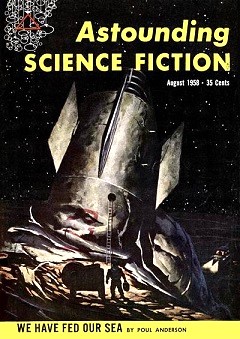
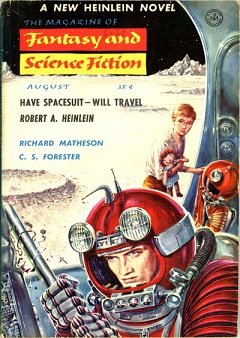
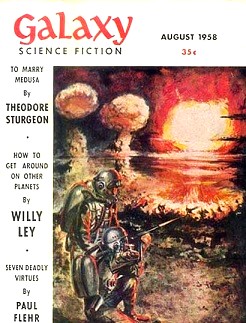
To view the entire list of weekly Old Time Radio episodes at Tangent Online, click here.